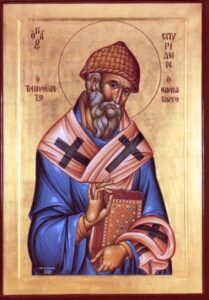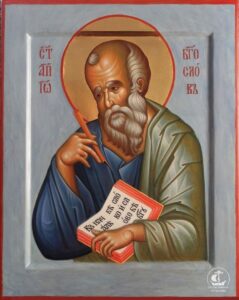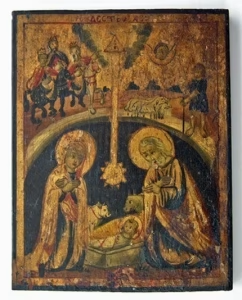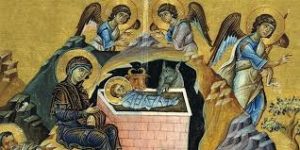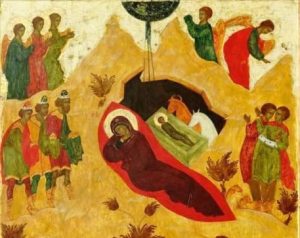HIEROMARTYR NICODEMUS OF POLTAVA
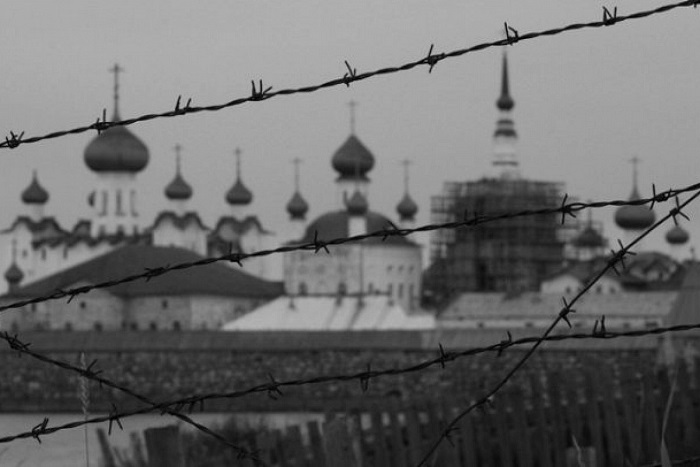
by Dr. Vladimir Moss
The clergy exiled to Solovki usually spent some time in the Transfiguration Cathedral in the Kremlin, and then in the sixth company. Among them was Fr. Nicodemus. Stooped, approaching 80, he was nevertheless fit and healthy for his age. He came from the Poltava region, had been a priest for 50 years, and had been sentenced by the Poltava NKVD because he did not fulfill the new rules of the Bolsheviks concerning witnesses for weddings, doctor’s certificates for funerals, etc. He had been sent first to Kem, where they took away his pectoral cross, epitrachelion, riza and kamilavka, leaving him only with his Gospel. He wore a red army hat with the red star cut out. This didn’t put him out. “The people say that you can recognize a priest in bast matting. Besides, everyone knows me. And I’m not wearing bast matting, but good material, I bought it in Kiev. As night was falling, the prisoners, starving and exhausted after a long day’s work, asked Fr. Nicodemus to tell them a story. They meant by that a story from the Bible. Every evening there was an attentive crowd in front of the old altar. The prisoners interrupted the story-telling with critical or enthusiastic remarks (Fr. Nicodemus was a very good story-teller). They particularly loved the parable of the Prodigal Son. Identifying themselves with him, they wanted to know the story to the last detail. At the point that the son returned to his father, only sobs and sighs could be heard all around. Some animated opinions were expressed: some found the father’s loving behaviour in receiving the rogue again unacceptable. Others, putting themselves in the place of the father, wondered whether the return of the son would have given them joy. The next day, after work, Boris Shirayev, who later wrote his story, wanted to meet the story-teller. He was sitting on his bed, on the third level. A ray of sunlight was playing on his face, and one could see the pleasure this gave him: “What sunshine today, what happiness!” They started up a conversation. The father wanted to know the life of Shirayev. On learning that he had ten more years of his sentence to serve, he said to him: “My son, don’t be sad, you are still young, you have the whole of your life in front of you… Only thank God.” “Why the devil should I thank him? How can I be happy with this dog’s life?” “Don’t speak like that, don’t speak like that. No joy comes from the devil. Only sadness and despair come from him. But from God comes joy and gaiety.” “One is not a man here, one is nothing, just a protoplasm.” “I a nothing, a protoplasm?! I am a child of God, no-one can take that dignity from me. God has placed me in the middle of a community which I must protect.” He spat on the earth in indignation. Shirayev retorted: “What a fine parish you have – these thieves, these filthy bandits, dressed in rags, covered with lice and starving, these fallen officers, these shipwrecked clergy, what miserable pariahs!” “So that you may know once and for all, this is the most beautiful parish I have ever had. Look: what splendour, three levels!” He pointed to the camp beds superimposed on top of each other. “Christ would be proud of this community. Do you think that it was only the scribes who went to Him? No, it was the wretched ones, the starving, the crippled who sought healing, the blind, the epileptic, the possessed, the sinners, the thieves, the peasants and the fishermen. Do you think that they thought that God had come to bring them salvation? No, my little one. They had heard that an extraordinary man was going round the country healing the blind and the paralytics, and cleansing the lepers. No! They went to Him to see what kind of man He was. They listened to Him and some began to understand. With the eyes of the body they saw nothing extraordinary. However, some had the eyes of their souls opened. It was the same as with the lepers; He had cured that one of his ulcers, but hundred by His preaching. What a fool you are! You’ve read the Scriptures only with your carnal eyes and your materialist spirit.” “What miracles are you talking about? No-one here needs to be healed, we don’t have lepers any more!” “You say that we don’t have lepers anymore! You see nothing, look around you. Who is lying down over here, who is dragging himself along over there, who is coughing? All of them are lepers who are asking for forgiveness. They don’t know that they’re asking for it, but they’re doing it without words. And not only here, it’s the same throughout the world. Everyone is hungering and thirsting for the word of salvation which comes from God.” Big tears flowed out of his shining eyes and stopped, clinging to his white beard. Seizing Shirayev’s head, the priest turned it towards the frescoes blackened by the smoke. One could only see one figure prostrated on the ground and another with his hands raised to heaven in thanksgiving. It was the father with the prodigal son. “Look, open your eyes, rejoice!”
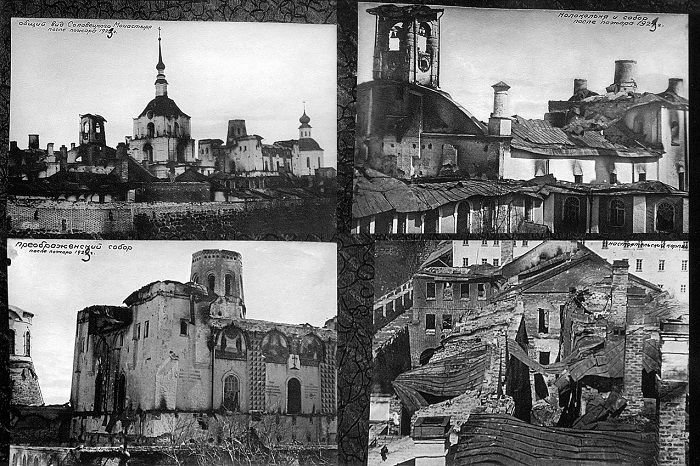
Fr. Nicodemus had arrived in Solovki a few days earlier, in a convoy. They had spent nine days in a train. In the railway carriages there had been cages which each contained three people. They were so crowded that in order for one to move the two others had to change position. The guards patrolled between the cages. In Fr. Nicodemus’ cage there was a robber and a Muslim Tartar. During the night the priest read and chanted the services in a low voice. He murmured the evening hymn: “Now that we have come to the setting of the sun, and behold the evening light, we praise the Father, Son and Holy Spirit, God…” The Tartar understood immediately. Although he did not understand Russian, He nevertheless began to pray in his way. The thief was silent, crouching like a rabbit. He had stubbed out his cigarette-end in his pocket. Fr. Nicodemus continued to pray: “From my youth have many passions warred against me. But do Thou Thyself defend and save me, O my Saviour… In the Holy Spirit every soul is given life…” At the words during the Great Doxology, which he said in a soft voice: “O Lord God, Lamb of God, that takest away the sin of the world, have mercy on us…”, the thief immediately made the sign of the cross. Fr. Nicodemus said to Shirayev: “And so we have served God for nine nights, for one can serve Him anywhere. God has said: ‘There where two or three are gathered together in My name, I will be in the midst of them.’ But we were three! What joy that gave me! We couldn’t move, we were frightened of speaking out loud, but the spirit was free and this silent communion with our neighbours was magnificent.” “But they didn’t understand your prayers!” “Why should they not have understood them? They prayed all the same, that means that they understood. They understood with the heart.” No one knew his surname, but that was unimportant. The priest-consoler was known everywhere. He told stories in a wonderful way – stories from the Bible and the lives of the saints, but also simple, real-life stories from his former parishes. One day, a commissar was passing the night in the barracks. “Pope, I want to bring a woman here for the night, what do you think of that?” “What do I think of it? In my seventy years, I have seen many things; you are young and full of passion, if you cannot do without her, do as seems best to you.” “Shall I bring you one, too?” “No, my child, don’t worry about me, I have been a widower for fifty years.” “Has the devil never tempted you?” He replied: “Of course he has tempted me. Isn’t a pope a man? We all have human feelings, and it is the devil’s task to tempt us. And so he tempts me and I respond with prayer.” They conversed like this for a long time. The commissar did not bring in a woman, but two packets of tobacco. They called him secretly to come and visit the sick and the dying so as to say a prayer. All those who were heavy laden came to him in secret.
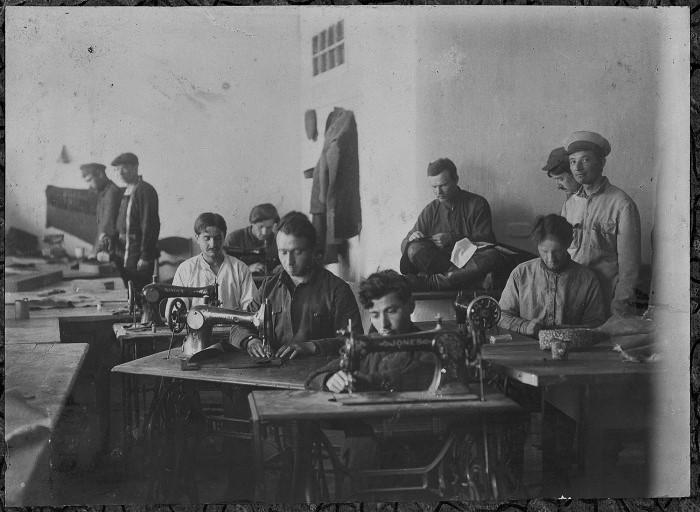
One day, a thief, a big, loud fellow who was always blaspheming, was crushed by a tree. They called Fr. Nicodemus; he came, but a guard was already there who wanted to drive the priest away. Nicodemus said to him calmly: “A man is dying, he needs a last word, that’s not going to last a long time, step aside a little.” The chekist obeyed. The thief could no longer speak. Stretching out the three fingers of his hand, he indicated that he had killed three men. The father gave him absolution and he died in peace. He was a great connoisseur of the human heart. Like a woodcutter, he went from one part of the camp to the other. Someone was despondent, so he sat down beside him and talked about everyday things. Without beating about the bush, he attacked the problem. He said: “My child, pray to Saint Nicholas and the Mother of God of Tenderness and say to him: ‘Your servant is suffering, he is sad, take his pain upon yourself and intercede for him. Drive away my sadness, Saint Nicholas.’ He will help you, but you must pray to him and remind him often. He has a lot to do. The whole world is asking for his help, at his age, he could forget. But you remind him.” In the evening, when he was telling his “holy stories”, as the thieves called them, the great, sombre church was full of people. He spoke a language which they understood. He told the stories with the aid of images, embellishing the scene so that one would have thought one was with Abraham under the oak of Mamre when the three visitors approached. He had himself given the order to his wife to bring in the veal, and he himself had been the father of the prodigal son who was so moved by the return of his child. Boris Shiryaev writes: “The face of the old priest shining with light stood in front of me and blotted out everything from me: both the rows of hard-labour bunks, and the human mishmash crawling on them, and the charred, smoky walls of the defiled, desecrated church.” Fr. Nicodemus never feared the wrath of the bosses, and never refused to carry out his pastoral duty. They led him secretly “to those women who wished to receive Communion. The rabble contrived to push him through the window into the hospital to the dying, which was very difficult and dangerous.” It was inevitable that Fr. Nicodemus should receive the crown of martyrdom. At Pascha, they had asked him to celebrate the Divine Liturgy in one of the barracks. Two guards entered unexpectedly: “Again you are spreading your opium!” Making the sign of the cross in their direction, he let them understand that the Holy Rite must not be interrupted. Then they led him into the death-cell, which had no heating. They stripped the prisoners of their outer clothing. The temperature in the ancient chapel was the same as outside, much lower than minus 20 degrees centigrade. To protect themselves from the cold, they piled up on the straw mattress, four lengthways, four sideways, and four diagonally. Those who were on top protected themselves as best they could with long strips of material. During the long dark nights, Fr. Nicodemus was right at the top, telling them his marvelous stories. On Holy Saturday, radiant with joy, they celebrated the Liturgy. After embracing and kissing each other three times, they heard Fr. Nicodemus tell the story of the Crucifixion and Resurrection. The next morning, they did not wake up. Their bodies were already cold. He had shown each of them the way to his last hour, then he had had to go the way he already knew alone…
Fr. Nicodemus came to Solovki in 1923 and died there on May 2, 1926.

